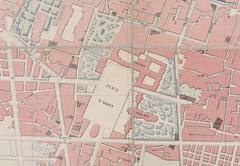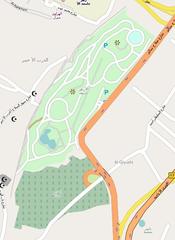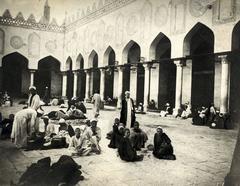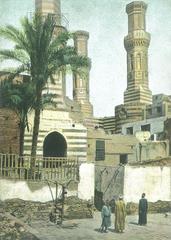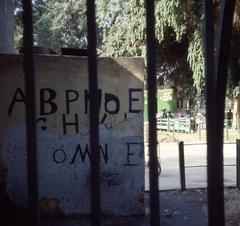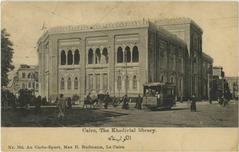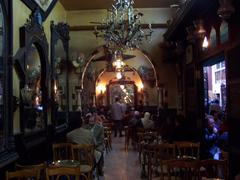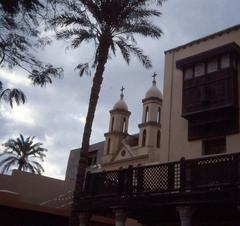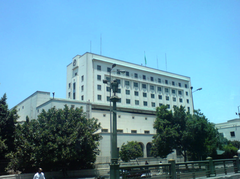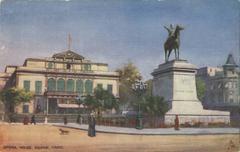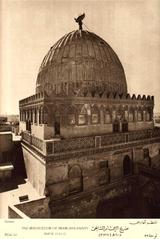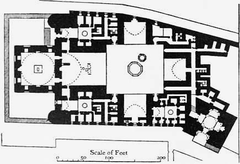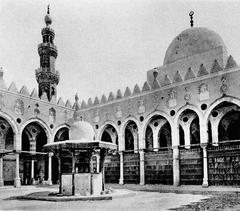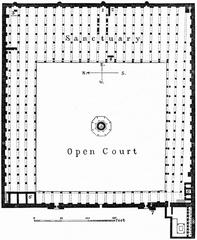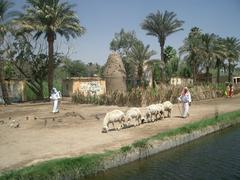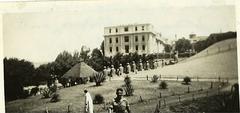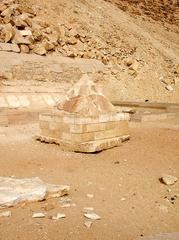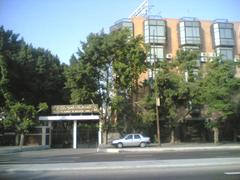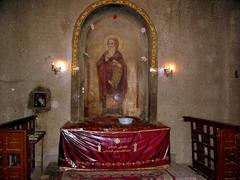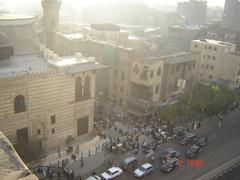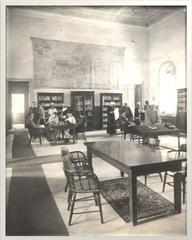Comprehensive Guide to Visiting Al-Suhaymi House, Cairo Governorate, Egypt
Date: 16/08/2024
Introduction
Welcome to Bayt Al-Suhaymi, an architectural gem nestled in the historic Al-Gamaliya district of Cairo, Egypt. Also known as the House of Suhaymi, this venerable residence stands as a testament to the grandeur of Ottoman-era residential architecture. Constructed in stages from 1648 to 1796, Bayt Al-Suhaymi offers an immersive glimpse into the cultural and social life of Cairo’s elite during the Ottoman period. The house is not only a marvel of intricate woodwork and Islamic architectural design but also a cultural hub that hosts various events year-round (Fanack). Whether you are a history enthusiast, architecture aficionado, or a casual traveler, Bayt Al-Suhaymi promises a unique and enriching experience. This guide aims to provide comprehensive information on the house’s history, architectural significance, visitor details, and tips to make the most out of your visit.
Table of Contents
- Introduction
- History of Bayt Al-Suhaymi
- Architectural Significance
- Renovation and Preservation
- Visitor Information
- Special Events and Guided Tours
- Cultural and Historical Impact
- FAQ
- Conclusion
History of Bayt Al-Suhaymi
Origins and Construction
Bayt Al-Suhaymi, located in the Al-Gamaliya district, is a quintessential example of Ottoman-era residential architecture in Cairo. The house is situated on the Al-Darb Al-Asfar alley, which connects Al-Mu’izz Lidin Allah Al-Fatimi Street and Al-Gamaliya Street. The house was constructed in two distinct stages. The southern section was built by Sheikh Abdulwahab al-Tablawi in 1648. Later, in 1796, Haji Ismail Çelebi constructed the northern section and merged it with the southern part to create a unified dwelling (Fanack).
Naming and Ownership
The house acquired its name from Sheikh Amin al-Suhaymi, who served as the sheikh at the Turkish riwaq at the Al-Azhar Mosque. Sheikh Amin al-Suhaymi was the last occupant before the family vacated it in 1931 (Fanack). The Egyptian government’s Committee for the Preservation of Arab Antiquities then registered the house as an Islamic antiquity.
Architectural Significance
Exterior Facade
Bayt Al-Suhaymi epitomizes the residential architectural style prevalent during the Middle Ages. The exterior facade features high windows, while the upper mashrabiyas are adorned with turned wood. Upon entering the house, visitors are greeted by a distinctive feature known as the “broken corridor,” a hallmark of Islamic architecture (Fanack).
Interior Layout and Features
The house was designed with separate spaces for men and women. The ground floor, known as the selamlik, was exclusively reserved for men, while the upper floor, known as haremlik, was reserved for women. The first floor houses premium rooms, while the second floor has dark, tight hallways that may not appeal to claustrophobics. Some rooms are empty, while others are decorated with carpets, tables, and antiques (Cairo360).
Renovation and Preservation
In the early 1990s, Bayt Al-Suhaymi underwent extensive renovation due to its deteriorating condition. The renovation was facilitated by a grant of ten million Egyptian pounds from the Arab Fund for Economic and Social Development (Fanack). Since then, the house has been open to the public as a museum and hosts concerts and plays organized by the Ministry of Culture, especially during Ramadan.
Visitor Information
Tickets and Visiting Hours
Bayt Al-Suhaymi is open every day from 9 AM to 5 PM. The entrance fee is 20 EGP for Egyptians and 40 EGP for foreign visitors. Students can benefit from a discounted rate of 10 EGP (Cairo360).
Travel Tips
- How to Get There: The easiest way to reach Bayt Al-Suhaymi is by taxi or ride-sharing services. Alternatively, you can take the Cairo Metro to the Al-Azhar station and walk from there.
- Best Time to Visit: Visit during the cooler months from October to April. Early mornings or late afternoons are ideal to avoid crowds.
- Nearby Attractions: Consider visiting the Al-Azhar Mosque, Khan el-Khalili Bazaar, and the Gayer-Anderson Museum.
Accessibility
Bayt Al-Suhaymi is partially accessible to visitors with mobility issues. The ground floor and courtyard are accessible, but the upper floors may pose challenges due to narrow and winding staircases.
Special Events and Guided Tours
Bayt Al-Suhaymi hosts a variety of special events throughout the year, including concerts and plays during Ramadan. Guided tours are available and highly recommended for those interested in detailed historical insights. Photography enthusiasts will find numerous photogenic spots throughout the house.
Cultural and Historical Impact
Bayt Al-Suhaymi stands as a symbol of Cairo’s rich architectural heritage, offering a glimpse into Egypt’s cultural tapestry during the Ottoman era. The house is located in a prime spot in Cairo, right along the old commercial road. It was regarded as one of the premium buildings at the time, thanks to its stunning design and prime location (Cairo360).
FAQ
What are the visiting hours of Bayt Al-Suhaymi? Bayt Al-Suhaymi is open every day from 9 AM to 5 PM.
How much are the tickets for Bayt Al-Suhaymi? The entrance fee is 20 EGP for Egyptians and 40 EGP for foreign visitors. Students can enter for 10 EGP.
Is Bayt Al-Suhaymi accessible for visitors with mobility issues? The ground floor and courtyard are accessible, but the upper floors may pose challenges due to narrow staircases.
Are guided tours available? Yes, guided tours are available and recommended for a comprehensive understanding of the site’s history and significance.
Conclusion
Bayt Al-Suhaymi is a treasure trove of history and culture, offering visitors a unique glimpse into the architectural and cultural heritage of Cairo during the Ottoman era. Its meticulous design, historical significance, and the extensive renovation efforts have ensured that it remains a prominent cultural hub and a must-visit destination for anyone interested in the rich history of Egypt. Don’t miss the opportunity to delve into this treasure trove of history and culture on your next visit to Cairo. For more information and updates, be sure to download the mobile app Audiala, check out other related posts, or follow us on social media (Hannah Fielding).
References
- Fanack, 2023, Fanack https://fanack.com/egypt/culture-of-egypt/bayt-al-suhaymi-an-ottoman-cultural-icon-in-cairo/
- Cairo360, 2023, Cairo360 https://www.cairo360.com/article/sights-travel/cairos-hidden-gems-the-story-behind-bayt-al-suhaymi/
- Hannah Fielding, 2023, Hannah Fielding https://hannahfielding.net/bayt-al-suhaym
- Cairo Governorate, 2023, Cairo Governorate http://www.cairo.gov.eg/en/Culture/Pages/Cultural-Houses-Palaces-details.aspx?ID=6
- Wikipedia, 2023, Wikipedia https://en.wikipedia.org/wiki/Bayt_Al-Suhaymi
- Egypt Tours Portal, 2023, Egypt Tours Portal https://www.egypttoursportal.com/bayt-al-suhaymi/
- Egy Monuments, 2023, Egy Monuments https://egymonuments.gov.eg/monuments/bayt-al-suhaymi-house-of-suhaymi/
- Sharm Club, 2023, Sharm Club https://www.sharm-club.com/egypt/islamic-sightseeings/bayt-al-suhaymi
- ETB Tours Egypt, 2023, ETB Tours Egypt https://www.etbtoursegypt.com/Wiki/Egypt-Travel-Guide/bayt-al-suhaymi-house-of-suhaymi



